
Other items in this column include:
*Jewish community coronavirus news
* San Diego County Judaica
*Recommended reading
*Mazal tov! Mazal tov!
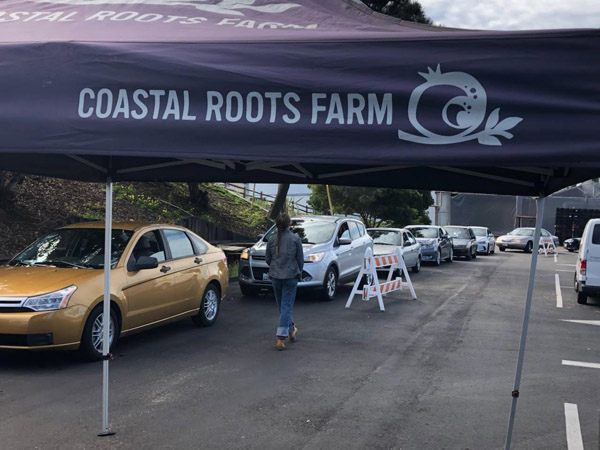

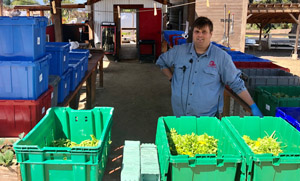
SAN DIEGO — People are queuing to obtain food for themselves and for their pets at a much higher rate than prior to the onset of the coronavirus pandemic, according to Jewish community members who are officers respectively of the Coastal Roots Farm and the San Diego Humane Society.
Kesha Spoor, philanthropy and communications manager for the Coastal Roots Farm in Encinitas, said that in the past two weeks “we have seen double or triple the amount of people coming to our pay-what-you-can farm stand. In the past two weeks it has been almost 1,000 people whom we’ve reached, calculated on the basis of an average family of three.”
That statistic is for only the food stand, which allows people to choose such produce as lettuce, kale, mustard greens, carrots, beets, various herbs, radishes, and turnips and pay for them whatever they can afford. Some people take it for free, others pay market price, some pay something in between, and some donate money over and above the actual cost, Spoor said.
In addition to the food stand, Coastal Roots Farm has distribution programs to such groups as Holocaust survivors, patients at community clinics, military families and to veterans.
“In an average year we grow 40,000 pounds of food and distribute it to 20,000 people — or approximately 2,500 people a month across our distribution,” Spoor told me.
Cars entering the property at 441 Saxony Road are directed to a parking lot, where festive music plays to keep the atmosphere light. Two at a time, the cars are directed to the farm stand itself, and one at a time, drivers are invited to decide what produce they want packed for them. While they are waiting in the parking lot, Spoor said, people often share their appreciation with staff members, sometimes elaborating on how the coronavirus pandemic has been impacting them.
One gentleman wrote a letter to the Coastal Roots Farm, which Spoor said was a “touching testimonial.” It read: “You are the answer to our prayers. I am a combat disabled veteran. We would not get fresh produce without your help. We never had food like this ever. We can’t thank you enough. You made my wife cry, in a good way.”
The pay-as-you-go food stand is open from 12 p.m. to 3 p.m. Thursdays, and from 10 a.m. to 3 p.m. Sundays. Recognizing that it is only one part of a food distribution system, Coastal Roots Farms lists on its website other resources for people who need food.
Meanwhile, the volume of free food being distributed for pets has ballooned tremendously, according to Gary Weitzman, president and CEO of the San Diego Humane Society which operates shelters in San Diego, Escondido, and Oceanside.
“We fell like Costco here” in the San Diego shelter, he told me. “We have had cars lined up on the road to come into the parking lot to pick up food that we are distributing. We had about 70,000 pounds we distributed over the last two weeks and we will keep going until we run out, and hopefully we won’t run out. It has been a very huge, very alarming reality to recognize that people are running out of food for their pets. I am glad that we can provide it, and we will keep doing it.”
Over an ordinary two-week period, he said, the three shelters might distribute 1,000 pounds of food to clients with chronic illnesses, or homelessness, or with financial difficulties, so the demand has increased 70 times. “I think what is happening is that people are not able to get into the stores to pick up the food, and in many cases the food may not be there. It could well be that the people are under financial pressures. Were not going to ask those questions; were just going to give out the food.”
While the distributions are for pets who live in human’ homes, the animals still in the shelters also have needs, Weitzman said. “We have 120 animals available for adoption, 50 for foster care,” he said. Readers who are interested in bringing such a pet to their home should make an appointment via the Humane Society’s website.
Weitzman said with many animals giving birth in the spring, “our census goes up from about 800 animals a day to between 2,000 and 3,000, so there are lots of animals here, lots of pets.” Normally the Humane Society employs approximately 680 people supplemented by some 5,000 volunteers. But with Covid-19 keeping some members of these people at home, staff members are being asked to cross-train to do different jobs. “Veterinary nurses working on the shelter side, we need to train to fill in on the wildlife side,” he said. “We may have people working in admissions filling in on adoptions,” and so forth.
Anticipating problems that might come, Weitzman said, the society is concerned that people who are lone caretakers of pets might be hospitalized, or worse, during the pandemic, leaving their pets unattended. He urged neighbors to be aware of the pets that their neighbors have and to contact the shelter if they believe a pet has been left unattended, so it can be picked up and cared for. “We want to make sure that we have set up wards here for emergency boarding,” he said.
The Humane Society president said it was a great relief when scientists found that pets are not a danger to their owners because they neither get the disease, nor is their fur a vehicle for its transmission. Before that determination was made, he said, the Humane Society had thought there might be a need to have decontamination procedures in place for pets brought to its shelters. However, now that is considered unnecessary.
*

Jewish community coronavirus news
*Congresswoman Susan Davis has information on her website about the $2 trillion federal relief bill as well as information about state and local developments. Similarly City Councilwoman Barbara Bry links to information from the City of San Diego about its programs and policies.
*Speaking to congregants via the Intenet, Rabbi Mendel Polichenco of Chabad of Carmel Valley discussed a Torah portion in which priests were required not only to officiate over the sacrifices of animals at the Temple in Jerusalem, but also to clean up the ashes. Why was this the responsibility of a priest and not, say, a custodian? He said that preparation to do a mitzvah is an important part of service to God, as is any activity that assists in bringing the knowledge of Torah to the people.
*Chabad of La Costa put up two signs on fencing by its property in Carlsbad. One was a hopeful reference to the coronavirus pandemic. “This too shall pass.” The other celebrated the upcoming holiday: “Happy Passover.” Rabbi Yeruchem Eilfort explained his motivation this way: “It is our sacred duty to bring happiness to the world around us! As the Chasidic Masters say, ‘Think positive and it will be positive!'”
*
San Diego County Judaica
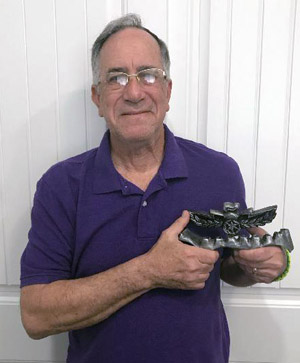
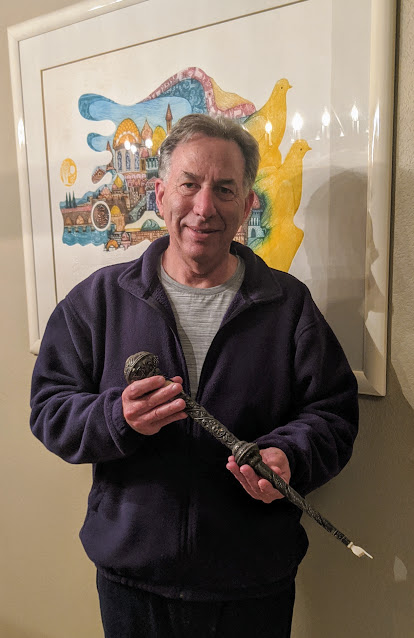
Rabbi Arthur “Zucky” Zuckerman, former spiritual leader of Congregation Beth Am, sent to us from his home in Mesquite, Arizona, a photo of himself with a chanukiah that was presented to him as a chaplain for the San Diego County Sheriff’s Department during a 2003 trip to Israel. It was one of 500 pieces made from shrapnel and featuring the insignia of Israel’s Bomb Unit. Perry Arenson shared with us a combination Yad (Torah Pointer) and Bisomim (Spice Box, used for Havdalah). he said the hand is made of ivory and the body is made of silver. The top portion opens to hold the spices. His mother found it in an antique store in Toledo, Spain, in the early 1960s, he reported.
Recommended reading
Ken Stone in Times of San Diego tells of a letter sent by journalism professors across the country criticizing Fox News for minimizing the threat of the coronavirus. Among the signers is Todd Gitlin of the Columbia School of Journalism who formerly taught at UC San Diego.
Astronaut Jessica Meir, who has a doctorate in marine biology from Scripps Institution of Technology, offered her suggestions from the International Space Station on ways to deal with being cooped up, The Times of Israel reports.
*
Mazal tov! Mazal tov!
Jewish Insider reports that “former Vice President Joe Biden welcomed a new Jewish grandchild into the world, a son to Hunter Biden and his new wife, Melissa Cohen.”
*
Donald H. Harrison is editor of San Diego Jewish World. He may be contacted via donald.harrison@sdjewishworld.com
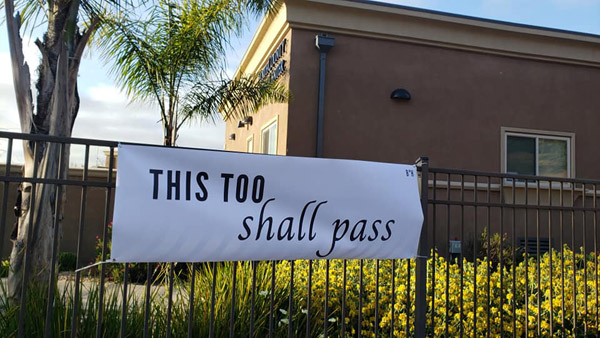
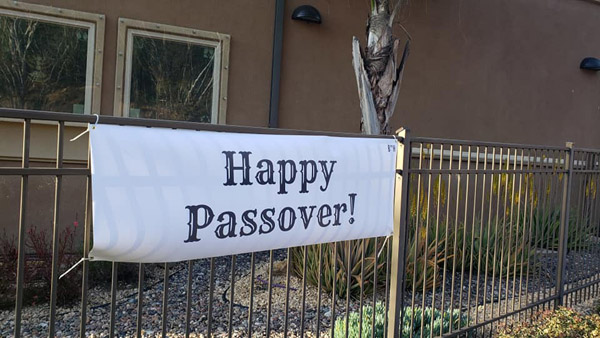
Your “open hours are on Thursday and Sunday? Could you explain to me the process of obtaining your goods? Grove thru/walk up/order online/on phone?
Thanks sooo much!
Nancy in Vista
Ps…love your organization…bought our 1st home in Leucadia in 1975!!!! $45,000!!!
Thanks 🙏